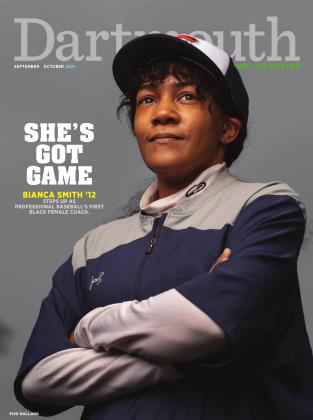Unarmed Conflict
PURSUITS
alumni books
JONATHAN PELSON ’86
Wireless Wars: China’s Dangerous Domination of 5G and How We’re Fighting Back BENBELLA BOOKS
288 PP. $27.95
MERELY TYPING THE WORD “HUAWEI” IN A search engine may be enough to trigger attention from Chinese spies. That’s according to the eye-opening Wireless Wars, a behind-the-scenes, pull-no-punches account of how the Chinese telecom company used surveillance and other questionable tactics to go from wireless no-name to $120 billion juggernaut in afew years’ time.
Indeed, as Pelson was wrapping up his book— whose 100-plus interviews include former Huawei executives—he received a mysterious message offering him ahigh-paying job at a state-owned Chinese business, even though China was not even mentioned in his online resume. “It didn’t make sense,” he writes, though he recognizes the offer as a classic Huawei move: Silencing critics by buying them off.
Huawei has engaged in ruthless, and possibly illegal, tactics in the pursuit of growth, Pelson charges, such as hiding microphones in the walls of the headquarters of the African Union to eavesdrop on ambassadors and installing cell phone equipment near military bases in parts of rural America for similar purposes. Pelson, a former tech executive who worked for companies such as Lucent, leaves no doubt where he stands. “Yes. This is war,” he writes. He also breaks narrative custom and uses bullet points to argue a case for ways to limit Huawei’s dominance over fifth-generation wireless networks—the fast, expansive standard known as 5G.
Quotes that kick off each chapter, from figures such as Mao Zedong, Mike Pompeo, and Napoleon Bonaparte (“Never interrupt your enemy when he is making a mistake”), drive home the battle-royal framing.
Still, a reader might wish to hear more from Huawei executives in their defense. Pelson says he went with the company’s prior official responses because “that’s all they would have given me” and that some Huawei sources asked not to be quoted for fear of reprisals.
Perhaps Wireless’ greatest contribution is the details showing just how much things have changed in a country that was, until recent times, mostly agricultural. Into the 1980s, writes Pelson, who traveled to China on sales trips, most citizens aspired to own only sanshengyixiang, or “three rounds and a sound”—a watch, a bicycle, a sewing machine, and a radio. All may not be lost yet. The Communist land of five-year plans is “vulnerable to the agility of free countries and marketplaces,” Pelson writes, in a try at an optimistic conclusion, “and China may find it has been caught in its own trap.”
C.J. Hughes ’92
EDITOR’S PICKS
EMILY KATZ ANHALT ’80 Embattled: How Ancient Greek Myths Empower Us to Resist Tyranny
Redwood Press/Stanford University
The author, a professor of classics at Sarah Lawrence College, turns to the ancient works of Homer, Aeschylus, and Sophocles as a lens through which to consider contemporary concerns about extremist ideologies, abuse of power, prejudice, and injustice. Anhalt explores insights we can glean from Greek myths about leadership, reality, and deception—and their consequences.
KEITH BOYKIN ’87 Race Against Time: The Politics of a Darkening America
Bold Type Books
As a new multiracial majority emerges in the United States, along with a surge in white resentment, the author shows how Americans’ failure to address some of the grievous realities of racism could leave us completely unprepared for the future. Boykin, a CNN commentator, infuses his review of five presidential administrations with his personal experiences as a Black man and a hope that history need not be destiny.
KATHERINE A. SHERBROOKE ’89 Leaving Coy’s Hill
Pegasus Books
Based on the life of pioneering suffragist and abolitionist Lucy Stone, the first Massachusetts woman to earn a college degree, this moving novel portrays a former farm girl’s courageous crusade for equality amid daunting societal constraints. It also delves into her complex family life and search for personal fulfillment.
MEREDITH W. RUSSO MATHIAS ’08 The Shimmering State
Atria/Simon & Schuster
Writing as Meredith Westgate, the author follows two vivid characters—a photographer and a ballerina—who mysteriously land as patients in a treatment center for abuse of an experimental memory drug with no recollection of how they wound up there. At times dreamlike, at times disturbing, this riveting tale explores how memories can be tricky traps or help people redefine themselves.
Additional titles and excerpts can be found on the DAW website.
 View Full Issue
View Full Issue
More From This Issue
-
 FEATURES
FEATURESShe’s Got Game
SEPTEMBER | OCTOBER 2021 By JIM COLLINS '84 -
 Features
FeaturesBring On The Heathens
SEPTEMBER | OCTOBER 2021 By JAMES B. MEIGS '80 -
 Features
FeaturesOverboard
SEPTEMBER | OCTOBER 2021 By C.J. Hughes ’92 -
 Interview
Interview“It Has Been a Difficult Year”
SEPTEMBER | OCTOBER 2021 By Irene M. Wielawski -
 notebook
notebookCommencement Returns
SEPTEMBER | OCTOBER 2021 -
 notebook
notebookStar Trekker
SEPTEMBER | OCTOBER 2021 By SUE SHOCK
C.J. Hughes ’92
-
 Article
ArticleGetting A Head
Nov/Dec 2005 By C.J. Hughes ’92 -
 Article
ArticleHALLS OF NAME
May/June 2007 By C.J. Hughes ’92 -
 Article
ArticleHALLS OF NAME
Sept/Oct 2007 By C.J. Hughes ’92 -
 COVER STORY
COVER STORYWhy Is Dartmouth So Expensive?
MAY | JUNE By C.J. Hughes ’92 -
 PURSUITS
PURSUITSFlight Control
JULY | AUGUST 2022 By C.J. Hughes ’92 -
 FEATURES
FEATURESEscape From the Taliban
JANUARY | FEBRUARY 2023 By C.J. Hughes ’92
Pursuits
-
 pursuits
pursuitsInvestigating the Darker Corners
MAY | JUNE 2017 -
 PURSUITS
PURSUITSMatch Maker
SEPTEMBER | OCTOBER 2019 By Annie Phifer ’20 -
 PURSUITS
PURSUITSRock and Beyond
MARCH/APRIL 2023 By C.J. Hughes ’92 -
 pursuits
pursuitsMothers of Invention
MARCH | APRIL 2018 By Heather Salerno -
 PURSUITS
PURSUITSArt of Glass
JANUARY | FEBRUARY 2020 By Jim Collins '84 -
 PURSUITS
PURSUITSUndiluted Pride
MAY | JUNE 2019 By Jimmy Nguyen ’21

